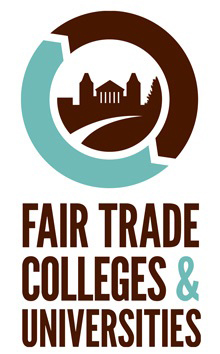UNIVERSITY OF WISCONSIN River Falls
Operations and Initiatives
Food and Dining
Dining Services at UWRF made a huge transition when it moved out of Hagestad Student Center and Rodli Commons to the new University Center in 2007. Both previous facilities and the equipment were extremely inefficient. In addition, spreading dining operations between two separate facilities created layers of duplication and inefficiencies in equipment, labor and overall operations. Now, there is a very efficient single production kitchen in the UC for all dining locations on campus and a high percentage of the dining production equipment is much more efficient than that previously used.
UWRF has been raising beef cattle and offering meat products for sale for years. Dairy Science students also have a hand in producing cheeses and ice cream for sale at the Falcon Food Store.
Fair Trade Designation
University of Wisconsin River Falls is committed to being a socially, economically, and environmentally responsible college. Our fair-trade campaign aims to make fair choices when buying food and clothing for students, faculty, staff members, and visitors. The food we purchase also has an impact on the environment. Becoming certified helps us assist our role as the buyer.
- Fair Trade prioritizes our people and our planet
- By Being a Fair Trade Designated Campus, UW-River Falls builds on its sustainability commitment by purchasing products that are enviornmentally, socially, and economically responsible
- UW-River Falls prioritizes our purchasing by taking action for our planet and our people
- Along with purchasing Fair Trade Certified products UW-River Falls has a responsibility in educating the public about these products and their impact

Food Systems
Energy & Water Savings:
- Trayless system for 20–40% savings in energy, water, labor and waste
- Water reuse system saves hundreds of gallons of water daily
- Annual replacement of ineffective gaskets on all coolers, freezers, and cooking equipment
- Concerted effort to shut down underutilized equipment whenever possible, such as during breaks and summer
- Replace outdated equipment with Energy Star® and other more efficient products
- Determine the feasibility of installing heat recovery units in the exhaust hoods and installation of more efficient display lighting over foods
- Night curtains are drawn each evening/weekend to minimize air loss from the reach-in refrigerators
- In 2015, production schedules were modified to conserve utilities to one day processing instead of 2 day processing
- Collaborate with Central Heating Plant to reduce energy usage when possible
Compostable Cups and Cutlery:
- RFP for a new food service contract required that all disposables be biodegradable and compostable
- In conjunction with CAFES, establish an on-campus food & disposable container composting facility
- In 2014, made the change from disposable to reusable lab jackets
- In 2012, began using recyclable ice cream tubs
Environment-friendly Cleaning:
- Apex chemicals are used in the warewasher; one of the most environmentally friendly commercial warewashing chemicals available
- In 2011, began using bio-enzymes to assist in dissolving grease going into the septic system
- Inedible product fed to swine at lab farm instead of disposed, when possible
Local Foods / Campus Garden:
- Aggressive efforts on increasing the amount of locally provided product and in enhancing the nutritional content of the product being used
- Pursuing establishment of an organic vegetable garden on campus (with the produce being utilized by Dining Services) operated and managed by students, with ties to many academic disciplines.










